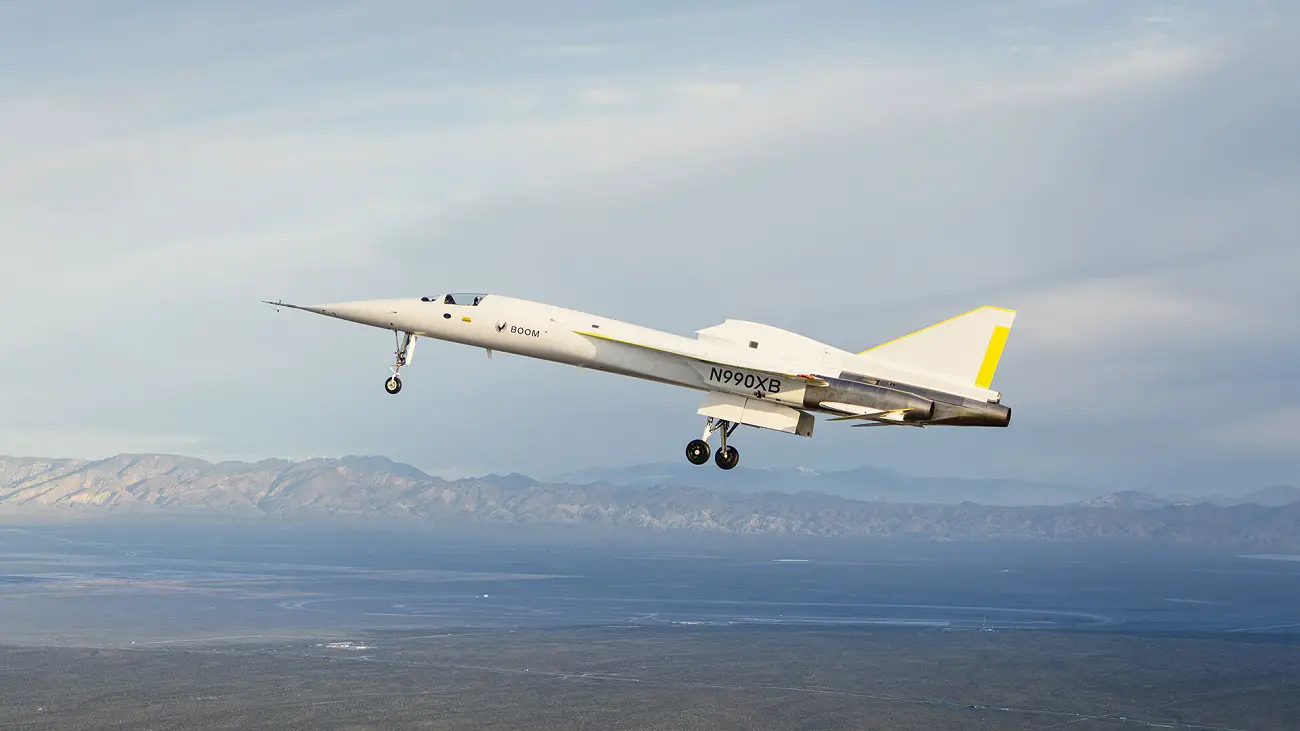Boom Supersonic, the company building the world’s fastest airliner, Overture, announced the successful flight of XB-1, the world’s first independently developed supersonic jet, at the Mojave Air & Space Port in Mojave, California. Like Overture, XB-1 leverages state-of-the-art technologies to enable efficient supersonic flight including carbon fiber composites, advanced avionics, digitally-optimized aerodynamics, and an advanced supersonic propulsion system. XB-1 was flown by Boom Chief Test Pilot Bill “Doc” Shoemaker and Test Pilot Tristan “Geppetto” Brandenburg flew the T-38 chase aircraft which monitored the flight. XB-1 took off from the Mojave Air & Space Port and flew in the same airspace that hosted many historic first flights, including the flights of the Bell X-1, the North American X-15, and the Lockheed SR-71 Blackbird. XB-1 met all of its test objectives, including safely and successfully achieving an altitude of 7,120 feet and speeds up to 238 knots (273 mph). The inaugural flight of the XB-1 demonstrator takes place as Overture continues to advance toward production, with a growing global network of Tier 1 suppliers and an order book including 130 orders and pre-orders from American Airlines, United Airlines, and Japan Airlines. Overture will carry 64-80 passengers at Mach 1.7, about twice the speed of today’s subsonic airliners. Optimized for speed, safety, and sustainability, Overture is designed to run on up to 100% sustainable aviation fuel (SAF).

“Everyone on the XB-1 team should be incredibly proud of this achievement. It has been a privilege to share this journey with so many dedicated and talented professionals. The experience we have gained in reaching this milestone will be invaluable to Boom’s revival of supersonic travel,” said Bill “Doc” Shoemaker, Chief Test Pilot for Boom Supersonic.
“Today, XB-1 took flight in the same hallowed airspace where the Bell X-1 first broke the sound barrier in 1947. I’ve been looking forward to this flight since founding Boom in 2014, and it marks the most significant milestone yet on our path to bring supersonic travel to passengers worldwide,” said Blake Scholl, founder and CEO of Boom Supersonic.

Two decades after Concorde’s retirement, the first flight of XB-1 marks the return of a civil supersonic aircraft to the skies and paves the way for the revival of mainstream supersonic travel. The XB-1 program provides the foundation for the design and development of Overture, while establishing a safety-first culture in engineering and manufacturing. XB-1 validates key technologies and innovations, including:
Augmented reality vision system: Two nose-mounted cameras, digitally augmented with attitude and flight path indications, feed a high resolution pilot display enabling excellent runway visibility. This system enables improved aerodynamic efficiency without the weight and complexity of a movable nose.
Digitally-optimized aerodynamics: Engineers used computational fluid dynamics simulations to explore thousands of designs for XB-1. The result is an optimized design that combines safe and stable operation at takeoff and landing with efficiency at supersonic speeds.
Carbon fiber composites: XB-1 is almost entirely made from carbon fiber composite materials, enabling it to realize a sophisticated aerodynamic design in a strong, lightweight structure.
Supersonic intakes: XB-1’s engine intakes slow supersonic air to subsonic speeds, efficiently converting kinetic energy into pressure energy, allowing conventional jet engines to power XB-1 from takeoff through supersonic flight.

Boom Supersonic’s mission is to make the world dramatically more accessible through flights that are faster, more affordable, more convenient, and more sustainable. Boom is developing Overture, the world’s fastest airliner, optimized for speed, safety, and sustainability. Overture will fly at twice the speed of today’s airliners and is optimized to run on up to 100% sustainable aviation fuel (SAF). Overture’s order book stands at 130 aircraft, including orders and pre-orders from American Airlines, United Airlines, and Japan Airlines. Boom is working with Northrop Grumman for government and defense applications of Overture. Suppliers and partners collaborating with Boom on the Overture program include Aernnova, Aciturri, Collins Aerospace, Eaton, Honeywell, Latecoere, Leonardo, Safran Landing Systems, and the United States Air Force. Symphony™ is the propulsion system that will power Overture, a Boom-developed engine with world-class suppliers including Florida Turbine Technologies (FTT), a business unit of Kratos Defense & Security Solutions, Inc., GE Additive, and StandardAero. XB-1 is Boom’s technology demonstrator aircraft and the world’s first independently developed supersonic jet. The aircraft first took flight in Mojave, CA in March 2024.
















